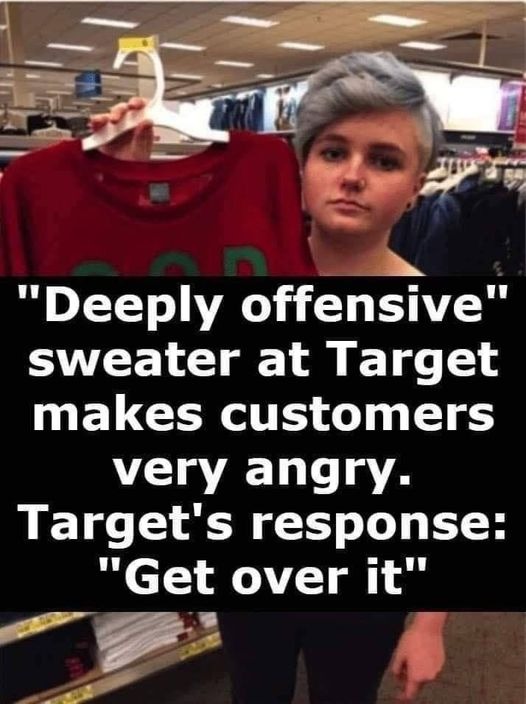In today’s world, even the most seemingly innocent items can spark heated debates. A recent incident at Target involving a red sweater exemplifies this phenomenon, shedding light on the intersection of humor, sensitivity, and societal awareness. The sweater in question featured a humorous twist on the acronym OCD, reinterpreting it as “Obsessive Christmas Disorder.” While the design may have been intended to evoke lighthearted holiday cheer, not everyone found it amusing.
One such person was Reign Murphy, a Target shopper who has personally experienced the challenges of living with obsessive-compulsive disorder. Upon seeing the sweater, Murphy felt deeply unsettled. To her, the design trivialized OCD, a serious mental health condition that affects millions of people worldwide. It was not just about the sweater; for Murphy, it represented a broader issue of insensitivity toward mental health struggles. Feeling compelled to speak out, she took to Twitter to share her concerns, posting a message that quickly gained traction online.

Murphy’s post resonated with many, sparking an intense discussion on social media platforms. On one side of the debate, people echoed Murphy’s sentiments, arguing that the sweater was inappropriate and disrespectful. They contended that mental health conditions should never be treated as punchlines for humor or profit. To them, the sweater was a stark reminder of how society sometimes fails to acknowledge the gravity of mental health issues.
On the other side, however, were individuals who viewed the sweater as harmless fun. They argued that it was meant to be a playful take on holiday enthusiasm and that interpreting it as offensive was an overreaction. This perspective highlighted the tension between differing views on what constitutes acceptable humor in a diverse and evolving society.
Amid the controversy, Target responded to the backlash with a public statement. A company representative expressed regret for any offense caused, acknowledging that the sweater might not resonate positively with everyone. However, Target ultimately decided to keep the item on store shelves, emphasizing that they believed in offering a wide variety of products to meet diverse tastes. The decision further fueled the debate, with some applauding Target for standing firm and others criticizing the company for failing to take stronger action in support of mental health advocacy.
This incident is far from the first time Target has found itself at the center of a product-related controversy. Over the years, the retail giant has faced criticism for items that some customers felt perpetuated negative stereotypes or failed to align with evolving cultural sensitivities. These moments often spark larger conversations about corporate responsibility and the delicate balance businesses must strike between creativity, humor, and inclusivity.
The debate over the OCD sweater serves as a poignant example of how seemingly small actions can have significant ripple effects. It raises important questions about how we use language and symbols, particularly in commercial contexts. In an era where mental health awareness is gaining greater prominence, these discussions are more relevant than ever. While humor and creativity are valuable, they must be wielded with care to avoid unintentionally alienating or offending individuals.
This incident also underscores the power of social media as a tool for collective conversation. Platforms like Twitter allow individuals like Murphy to voice their perspectives and amplify their messages to a global audience. At the same time, they provide a space for diverse viewpoints to emerge, fostering both agreement and disagreement. These dialogues, when approached respectfully, can help society navigate complex issues and develop a deeper understanding of one another’s experiences.
For consumers, the controversy invites reflection on their purchasing decisions and the values they support through their spending. For businesses, it highlights the importance of anticipating how their products might be perceived by a diverse audience. The line between playful creativity and potential insensitivity can be thin, and navigating it requires both thoughtfulness and awareness.
As our world grows increasingly complex and interconnected, such debates are likely to continue. They challenge us to consider the broader implications of our words and actions, even in seemingly trivial matters. More importantly, they provide an opportunity to learn and grow as a society. By engaging in open, thoughtful dialogue, we can strive to build a more compassionate and understanding world.
Ultimately, the red sweater at Target is more than just a piece of clothing—it is a symbol of larger societal dynamics. It reflects the tensions between humor and sensitivity, between free expression and responsibility. While there may not always be clear answers, the willingness to engage in these discussions is a step toward fostering empathy and mutual respect. Whether we find ourselves agreeing or disagreeing, what matters most is the effort to listen, learn, and consider perspectives beyond our own.
In the end, this incident reminds us of the power of small things to spark meaningful conversations. A single sweater may not change the world, but the discussions it inspires can help shape a culture that values both humor and humanity in equal measure.





